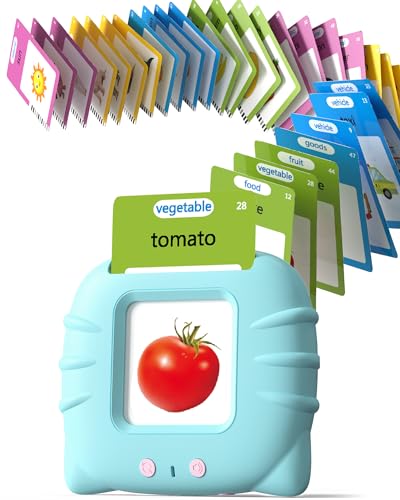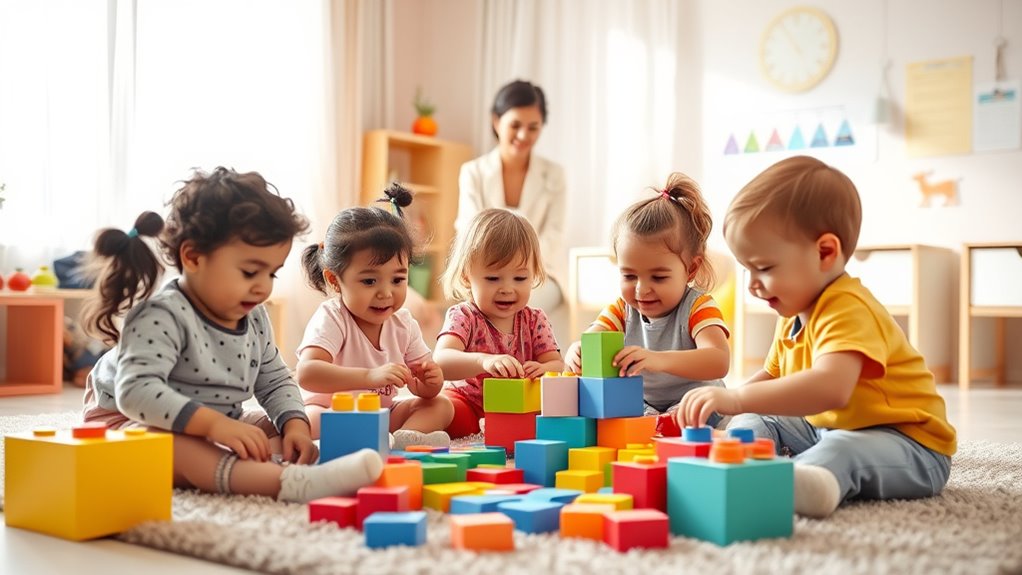From birth to toddlerhood, your child’s development is a remarkable journey filled with rapid growth in physical, emotional, and cognitive areas. You’ll witness significant milestones like crawling, walking, and early communication. The family environment and quality education play key roles in shaping their future. It’s vital to identify any developmental delays early and provide the right support. By understanding these stages and influences, you can foster their growth effectively. Continue exploring to learn essential strategies for supporting your child’s development.
Key Takeaways
- Child development encompasses physical, cognitive, social, emotional, and communication milestones from birth to toddlerhood.
- Early identification and intervention are crucial for optimizing developmental potential and addressing delays.
- A supportive family environment and quality early education are vital for fostering cognitive and emotional growth.
- Motor skills develop rapidly during infancy, with significant milestones like rolling, sitting, and walking occurring in the first two years.
- Language and communication skills are essential for social interactions and academic readiness, enhancing children’s ability to express themselves effectively.

Baby Memory Book for Boy or Girl – First 5 Year Keepsake Album from Pregnancy to Age Five – Baby Book to Record Baby's Milestones and Photos – 1st Gender Neutral Photo Books for Newborn Babies
Preserve Your Baby's Memories for Generations – Our Baby Keepsake Books are Designed with Superior Craftsmanship and the…
As an affiliate, we earn on qualifying purchases.
As an affiliate, we earn on qualifying purchases.
Understanding Developmental Milestones
Understanding developmental milestones is essential for tracking your child’s growth in various areas. These milestones are typically categorized into physical, cognitive, social, emotional, and communication domains.
For instance, physical milestones include crawling, walking, and running, while cognitive milestones encompass thinking, problem-solving, and reasoning. Social milestones involve your child’s interactions with others and forming relationships, whereas emotional milestones cover managing feelings and developing resilience. Communication milestones consist of babbling, speaking, and understanding language.
Utilizing milestone checklists, often provided by the CDC and pediatric associations, can help you monitor your child’s progress. Each milestone serves as a sign of development, generally following a predictable progression as your child ages. Keeping track of these can help you recognize their growth and development effectively.

Sassy Stacks of Circles Stacking Ring STEM Learning Toy, Age 6+ Months, Multi, 9 Piece Set
Straight post accepts different sized rings, strengthening hand-eye coordination
As an affiliate, we earn on qualifying purchases.
As an affiliate, we earn on qualifying purchases.
The Importance of Early Identification

Recognizing developmental milestones is just the beginning; early identification of any potential delays can make a significant difference in your child’s growth.
Detecting issues early enhances outcomes, allowing for improved treatment and support services tailored to your child’s needs. During these critical early years, your child’s brain is highly adaptable, making timely intervention essential for optimizing their developmental potential.
Addressing delays early reduces long-term implications, providing your family with valuable resources and knowledge for effective support. Collaborating with specialists guarantees a multidisciplinary approach, maximizing the benefits of intervention.

Airbition Talking Flash Cards for Toddlers 1 2 3 4 Year Olds, Montessori Language Learning with 224 Words, Pocket Speech Therapy Tools, and Speech Development Educational Playthings for Children
Toddler Montessori Learning Device: This educational talking flash card features 224 colorful illustrations and sounds. It includes animals,…
As an affiliate, we earn on qualifying purchases.
As an affiliate, we earn on qualifying purchases.
Key Factors Influencing Development

While various factors contribute to a child’s development, key influences can greatly shape their growth trajectory. Your family environment plays a crucial role, providing emotional support and stability.
Quality early education lays the groundwork for cognitive skills, while positive peer interactions enhance social competence. A safe physical environment guarantees overall health and security. Access to healthcare and community resources further impacts development.
Genetic factors also matter, with genes affecting physical growth and health conditions influencing development.
Socioeconomic status can determine access to education, healthcare, and overall opportunities. Additionally, psychological factors like stress and parenting styles considerably affect emotional and behavioral growth.
Together, these elements create a complex web that shapes your child’s unique developmental journey.

Assessment, Evaluation, and Programming System for Infants and Children (AEPS®), Test: Birth to Three Years and Three to Six Years
As an affiliate, we earn on qualifying purchases.
As an affiliate, we earn on qualifying purchases.
Overview of Developmental Stages

Child development unfolds in distinct stages, each marked by unique physical, cognitive, and emotional changes. It begins with prenatal development, where major body structures form.
Once your baby is born, they enter infancy (0-12 months), experiencing rapid physical and cognitive shifts, moving from complete dependence to some independence. As they grow into toddlerhood (1-2 years), you’ll notice increased mobility and autonomy.
During these stages, neuroplasticity plays a significant role; your child’s development is shaped by their experiences and environment. Cognitive milestones, like understanding object permanence by 9 months, and emotional expressions evolve as they bond with caregivers.
Your interactions during these formative years are vital in fostering resilience and healthy development.
Physical Growth in Infancy and Toddlerhood

During the first two years of life, you’ll witness remarkable physical growth in your infant and toddler. Newborns typically weigh around 7.5 pounds and measure about 19.5 inches long.
By four months, your baby will have doubled their birth weight, and by one year, it’ll be tripled. By age two, they’ll have quadrupled their birth weight!
By four months, babies double their birth weight; by one year, they triple it, and by age two, they quadruple it!
You’ll notice a significant increase in length as well, with about 30% growth by five months and over 50% by twelve months.
During this time, your little one will develop motor skills like rolling, sitting up, and eventually walking.
Nutrition, prenatal care, and environmental factors all play essential roles in supporting this rapid growth.
Regular check-ups are vital to monitor their development.
Cognitive Advancements During Early Years

Cognitive advancements in early years lay the foundation for lifelong learning and development. From birth, you’ll notice your infant showing a preference for social stimuli, marking the start of cognitive growth.
By 3-4 months, they grasp object permanence, realizing that objects still exist even when out of sight. As your child approaches age four, they’ll begin reasoning about abstract concepts and understanding social expectations.
Language flourishes rapidly during this time, expanding from about 20 words at 18 months to 200 words by 21 months. Your interactions and the environment play vital roles; nurturing relationships and high-quality early education can greatly enhance cognitive outcomes, fostering essential skills for future learning and problem-solving.
Social and Emotional Growth in Children

As your little one navigates the early years, social and emotional growth becomes essential for forming healthy relationships and developing resilience. This development involves managing emotions and handling social interactions, heavily influenced by early experiences. High-quality relationships with caregivers play a significant role, as children absorb social cues from those around them.
In infancy, emotional milestones, like social smiling and laughter, emerge, fostering bonds with caregivers through cuddling and talking. As toddlers, they recognize familiar faces and may experience stranger anxiety while asserting their independence. Tantrums are common as they learn to manage strong emotions.
The Role of Nutrition in Development

Nutrition plays an essential role in your child’s development, influencing everything from brain structure to emotional well-being. Key nutrients like protein, fats, and micronutrients such as iron and zinc are crucial for cognitive growth and brain health.
Omega-3 fatty acids further enhance brain function, improving memory and problem-solving skills. Inadequate nutrition can lead to cognitive impairments and behavioral issues, affecting your child’s academic performance and long-term cognitive health.
During infancy and toddlerhood, proper nutrition supports rapid growth and emotional development. Introducing a diverse diet rich in whole foods helps establish healthy eating habits early on.
Strategies for Supporting Development

Supporting your child’s development requires intentional strategies that foster growth across multiple domains. Engage in regular conversations, even if your child isn’t responding verbally, as this enhances language skills.
Provide responsive caregiving by consistently meeting their needs, which builds trust and emotional security. Create positive early learning experiences through hands-on activities and interactive play, promoting cognitive and social development.
Responsive caregiving fosters trust and emotional security, while hands-on activities promote cognitive and social development.
Encourage physical activity to support motor skills and overall health. Establish routines to give your child a sense of predictability.
Read to them daily, and incorporate music to stimulate auditory development. Finally, validate their feelings to help them manage emotions, fostering healthy social-emotional growth.
These strategies will create a strong foundation for your child’s development.
The Impact of Early Intervention Services

Early intervention services play an essential role in shaping a child’s development, especially when provided during the formative years.
These services notably enhance cognitive development by improving problem-solving skills and thinking abilities, leading to better academic achievements later on. When you engage in early intervention, your child’s language and communication skills also flourish, reducing frustration and making school readiness smoother.
In addition, early support for motor skill development helps your child achieve vital physical milestones and promotes overall health. Social-emotional development benefits too, as your child builds positive relationships and self-esteem.
Ultimately, these interventions can prevent lifelong challenges, foster family connections, and set the stage for your child’s independence and success.
Frequently Asked Questions
What Are Common Signs of Developmental Delays in Infants and Toddlers?
Common signs of developmental delays in infants and toddlers include lack of curiosity, short attention spans, and trouble understanding social cues.
You might notice difficulty with basic problem-solving or motor skills, like rolling or walking.
Speech delays can show up as a lack of babbling or single words by 15 months.
If your child struggles to form attachments or express emotions, these could also indicate social and emotional delays requiring attention.
How Can Parents Create a Nurturing Environment for Healthy Development?
To create a nurturing environment for healthy development, you should focus on safety, consistency, and emotional support.
Childproof your home to prevent accidents, establish structured routines for predictability, and engage in loving interactions with your child.
Provide opportunities for cognitive stimulation and social interactions, ensuring a balanced diet and regular health checks.
What Role Does Play Have in Early Childhood Development?
Play plays an essential role in early childhood development by fostering cognitive, emotional, social, and physical skills. When you engage your child in play, they enhance language abilities, problem-solving skills, and creativity.
Through role-playing and group activities, they learn to navigate emotions, build self-esteem, and develop empathy. Additionally, physical play promotes gross motor skills and overall health.
How Does Cultural Background Affect Child Development?
Cultural background greatly affects your child’s development by shaping their identity, self-concept, and social interactions.
It influences how you communicate with them, the values you emphasize, and the parenting styles you adopt. If you come from a culture that values relationships, your child may prioritize community over individualism.
When Should Parents Seek Professional Help for Developmental Concerns?
When you notice a stark contrast in your child’s behavior or development, it’s time to seek help.
If they’re missing milestones, showing sudden emotional shifts, or isolating themselves, don’t hesitate.
Even minor concerns can indicate deeper issues. You shouldn’t wait for signs to escalate; early intervention often leads to better outcomes.
Consulting healthcare providers or educators can provide clarity and support, ensuring your child gets the help they need.
Conclusion
You might think child development is just about milestones, but it’s so much more. Every moment—from a baby’s first smile to a toddler’s independence—shapes their future. By understanding these stages and the factors that influence growth, you can actively support your child’s journey. Remember, it’s never too early to start fostering their development. Embracing early intervention and nutrition can make a world of difference. Let’s guarantee every child has the chance to thrive and reach their full potential.









